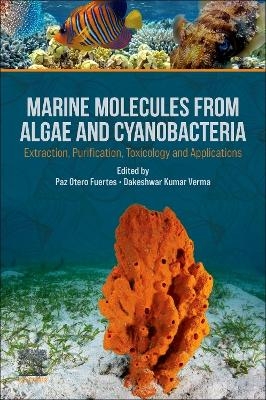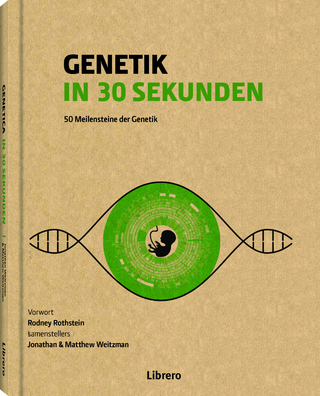
Marine Molecules from Algae and Cyanobacteria
Elsevier - Health Sciences Division (Verlag)
978-0-443-21674-9 (ISBN)
Gathering data about novel technologies and sources to obtain and isolate such as precious molecules as well as new applications for them is extremely appreciated in the chemical field. It is very useful for chemists to obtain these molecules with high purity to be used as analytical standards to calibrate the chromatography equipment. Many of these compounds are not commercially available, so the isolation methods of these molecules from microalgae, seaweeds, and cyanobacteria is a challenging task. The availability of some marine molecules has been a long-term problem due to the difficulty of their synthesis. Because of the complexity of their structure, the total synthesis has been shown to be difficult. Developing protocols to obtain reference standards from natural sources has shown satisfactory results in the chemical industry.
Marine Molecules From Algae and Cyanobacteria addresses these topics, highlighting fundamentals of biomolecules, their roll in living organism, structure elucidation, sources, important characteristics, and the industrial applications of these biomaterials for educational (academic) as well as industrial purposes. This book covers all methodologies used in the search of marine natural products: screening of marine molecules by chemical methods like HPLC, LC-MS/MS, the isolation of high-value compounds with biotechnological potential, discovery of new molecules, and the optimization of green extraction procedures of these molecules, such as supercritical fluid extraction and pressurized solvent extraction, and other alternative chemical techniques applied in the exploration for marine compound.
Dr. Paz Otero received her Bachelor´s Degree in Food Science at the University of Santiago de Compostela (USC), Spain. After that, she carried out her PhD at the Pharmacology Department of the Veterinary Faculty at the same University, awarded with the distinction Cum Laude and the Special PhD Award. Dr. Paz Otero has held postdoctoral research positions in Limerick Institute of Technology, Ireland (2014-2017) and The Institute of Food Science Research, CIAL (2017-2018) at the Autonomous University of Madrid. She has published extensively in the field of food chemistry, toxicology, analytical chemistry, pharmacology, nutrition and phycotoxin biology with more than 56 authored research articles, 70 contributions to international congress and 10 chapters books to date. Dr. Paz Otero also serves as invited reviewer for several research journals, editorial board member for online free-access journals and guest editor for special issues. Dakeshwar Kumar Verma is Assistant Professor of Chemistry at Government Digvijay Autonomous Postgraduate College, Rajnandgaon, India. His research is mainly focused on the preparation and design of organic compounds for various applications.
Part I Marine molecules from Algae
1. Diversity of marine algae, cultivation techniques, and sources of natural products for biotechnological applications
2. Extraction and purification of protein from algae (microalgae and seaweeds)
3. Extraction and enrichment of fatty acids from marine microalgae
4. Extraction and fractioning of polysaccharides from seaweeds
5. Phenolic compounds from algae: extraction methods, characterization, and applications
6. Phlorotannins from macroalgae: extraction, characterization and applications
7. Alkaloids from marine algae: isolation, bioactivities, food, and medical applications
8. Terpenes from marine algae: isolation, identification, and applications
9. Polysaccharides from seaweeds: extraction and application
10. Pigments from seaweeds: green extraction technologies, characterization, and industrial applications
11. Risk and benefits of consuming edible seaweeds: main toxigenic compounds of macroalgae and their impact on human health
12. Toxicity of marine secondary metabolites from microalgae: impact of main biotoxins on human health and analytical detection methods for their detection and quantification
Part II Cyanobacteria-producing compounds
13. Diversity of cyanobacteria, cultivation techniques, and source for natural products for biotechnological applications
14. Natural products from marine cyanobacteria for drug discovery
15. Cyanobacterial pigments: exploration of sources, recovery techniques, characterization, and diverse applications
16. Marine molecules from algae and cyanobacteria: extraction, purification, toxicology, and application
17. Toxicology of marine cyanobacteria
18. Carotenoids as added-value products from microalgae biorefinery: therapeutic potential of common carotenoids—current overview
| Erscheinungsdatum | 09.11.2024 |
|---|---|
| Verlagsort | Philadelphia |
| Sprache | englisch |
| Maße | 216 x 276 mm |
| Gewicht | 450 g |
| Themenwelt | Naturwissenschaften ► Biologie ► Genetik / Molekularbiologie |
| Naturwissenschaften ► Biologie ► Limnologie / Meeresbiologie | |
| ISBN-10 | 0-443-21674-6 / 0443216746 |
| ISBN-13 | 978-0-443-21674-9 / 9780443216749 |
| Zustand | Neuware |
| Informationen gemäß Produktsicherheitsverordnung (GPSR) | |
| Haben Sie eine Frage zum Produkt? |
aus dem Bereich


